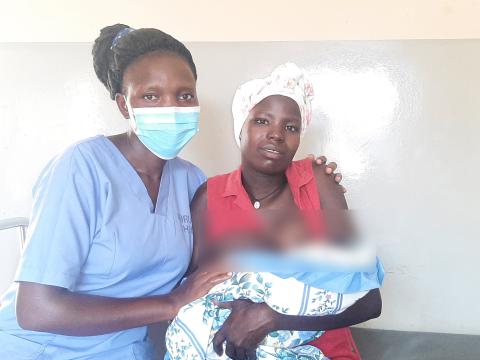Village Health Teams: Guardian angels saving the lives of children and mothers


Twenty-year-old Josephine is a mother of two, Ketty (three) and Epau (three months), from Ogangai village in Morungatuny sub-county, Amuria district, eastern Uganda. When Josephine was two months pregnant, Simon Enou, a VHT member for her community, encouraged and reminded her to go for antenatal care, completing all the eight recommended antenatal visits.
Josephine's husband, William (24) always accompanied her to Morungatuny Health Centre III. When she started experiencing labour pain, he rushed her to the health facility, where she had a safe delivery.
"It was a joy to give birth at the hospital", says Josephine. "I felt safe and cared for by the doctors, nurses and other staff, and the experience was great."
Today, Josephine uses her experience of safely delivering from the health facility to ask and encourage expectant mothers in her community not to risk their babies and their own lives by giving birth at home or seeking the help of traditional birth attendants. She says, "I want every pregnant mother to plan and give birth from the health care facility where medical staff are ready to attend to them every minute, check your blood pressure, help when there is rupture of the uterus or bleeding."

William shares his wife's passion. He engages and calls on men to support and care for their wives. "Pregnancy is not a surprise or an incident", he says. "It is [generally] a nine-month-long process. It's possible to end maternal and child deaths if we work together well to plan and support every woman to go through this life-giving process."
Simon Enou continued to check on Josephine and the baby even after being discharged from the hospital. He educated her on exclusive feeding, identifying the danger signs such as bleeding, swelling and changing of colour of the umbilical cord, and where to seek help. "He was like a guardian angel", says Josephine. "Always watched over us to ensure we were fine at all times."
Christine Atuto, an enrolled midwife and head of the maternity department at Morungatuny Health Centre III, says that during antenatal visits, medical staff teach mothers how to take care of themselves during pregnancy and after giving birth. "We talk to pregnant women and mothers about a lot of things, including proper feeding and how to care for themselves and their newborn babies."
On average, 40 deliveries are safely conducted at Morungatuny Health Centre III every month. Christine attributes the high turn-up to change in health-seeking behaviour among pregnant women to an enhanced collaboration between the health facility and World Vision-trained VHTs.
"When it comes to maternal and child health, there is no doubt that VHTs are the heroes of our health system," says Christine. "At health facilities, we wouldn't do much without these gallant volunteers mobilising and educating women in their neighbourhoods about proper prenatal, neonatal and postnatal care; referring, reminding and encouraging mothers to seek health services in time. On a scale of 100, VHTs are responsible for 80 percent of the work. They are a strong bridge between health care facilities and communities."

The health ministry established VHTs to empower communities to take care of their health, create awareness of the health services, and strengthen health services, including improving nutrition, sanitation, and hygiene practices at the household level.
World Vision work with the VHT structure to implement community models such as ttC. To date, the burden of common childhood illnesses such as malaria, diarrhoea, and pneumonia in Morungatuny / Olwa community has reduced from 46 in January 2021 to 28 in October 2021 (Morungatuny OPD report), thanks to World Vision's ttC model.
VHT members are trained under the ttC model to support families, especially pregnant women and lactating mothers, to understand and adopt critical health practices to reduce maternal and child deaths. The VHT members visit households at an appointed time to offer an appropriate message and counselling to household members, including men.
Amuria is one of 18 districts across the country where World Vision implements health interventions to increase the proportion of children aged 0-5 years who are well-nourished and protected from infection and disease. In 2021, more than 60,000 children aged 0-59 months were reached across the country by a trained community health worker, while 185 malnourished children rehabilitated recovered fully.
-
Story and Photos by David Obita - Health and Nutrition Officer for World Vision in Uganda